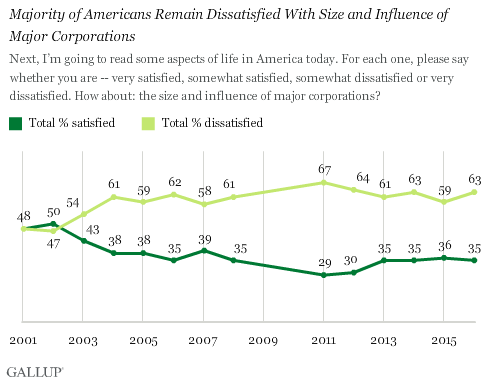By Rebecca Riffkin and Glynn Wilson –
WASHINGTON, D.C. — A large majority of Americans, 63 percent, say they are dissatisfied with the size and influence of major corporations, according to the latest Gallup poll on the subject.
“Americans have long been suspicious of the power of big corporations, but they have not been supportive of increasing regulation of businesses,” Gallup says in its analysis of the data, speculating that it has something to do with new regulations President Barack Obama has proposed or enacted, most notably related to energy, especially the coal industry.
But in fact, far more people are disgruntled with more and more power and wealth being concentrated in the hands of fewer and fewer large, multinational corporations, paying lower wages in real dollars, and a majority of the public has long supported regulations on industry, especially environmental regulations.

Gallup’s data only shows a small minority of 25 who say they want government regulation decreased. It seems Gallup’s own analysts are distorting its own findings either due to its own bias or in the attempt to appear to be unbiased. The numbers are clear. People are not happy with the concentration of corporate power over the past 40 years and they mostly support government regulations.
Democratic presidential candidates Hillary Clinton and Bernie Sanders have also advocated for new regulations, especially on Wall Street, as Gallup says.
“This may not be supported by the quarter of Americans who want regulation decreased, or the third who are satisfied with current level of regulation,” according to Gallup.
But so what?
This is the same ignorant quarter of the U.S. population who said they supported the tea party and still reported a positive rating of disgraced former President George W. Bush, who left office with an approval rating in the 20s. Compare this to President Obama’s public approval rating near the end of his two terms in Congress which stands near 50 percent.
Politicians are always unpopular with some percentage of the American public, especially now with the country so divided along party lines.
Democrats (40 percent) are more likely than Republicans (26 percent) and independents (32 percent) to be satisfied with government regulation of businesses and industries. More Democrats are dissatisfied and want regulation increased (27 percent).
Perhaps the campaign of Bernie Sanders is making a difference on this front.
Bernie Sanders Campaigns for President in Birmingham, Alabama
Republicans are almost exactly the opposite. Nearly half of Republicans, 45 percent, say they are dissatisfied with the current government and want less regulation. Independents are evenly split. While 22 percent say they are dissatisfied and want more regulation, 22 percent say they are dissatisfied and want less regulation.
So what you might ask?
This is a debate that has been going on in a way since the founding of the country. Do we want a strong federal government, or not? It’s the people who tend to always vote Republican who don’t seem to learn from our experiences like the BP oil spill in the Gulf of Mexico in 2010, when even a federal judge eventually found that corporate negligence and a lack of effective federal oversight was responsible for the largest and worse environmental disaster in American history.
Oh, and by the way. The vast majority of the American public are not in favor of environmental destruction. They may tell pollsters they tend to be conservative and pro-business, but not when it comes to devastation of the Earth. It will take government regulations to prevent that.
Survey Methods
Results for this Gallup poll are based on telephone interviews conducted Jan. 6-10, 2016, with a random sample of 1,012 adults, aged 18 and older, living in all 50 U.S. states and the District of Columbia. For results based on the total sample of national adults, the margin of sampling error is plus or minus 4 percentage points at the 95 percent confidence level. All reported margins of sampling error include computed design effects for weighting.
Each sample of national adults includes a minimum quota of 60 percent cellphone respondents and 40 percent landline respondents, with additional minimum quotas by time zone within region. Landline and cellular telephone numbers are selected using random-digit-dial methods.













